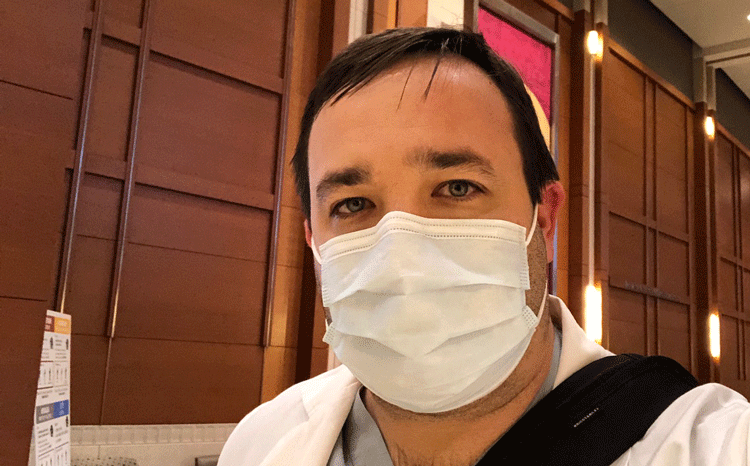
Take a Deep Breath
Apr 8, 2020
Dr. Brad Bemiss got his first taste of coronavirus in late February when an elderly lung transplant patient of his came to the hospital for an issue unrelated to COVID-19. Bemiss, who is a pulmonologist and professor at Loyola University Medical Center in Chicago and a 2004 Xavier graduate, treated him and sent him back to the nursing home where he lived.
Two days later, the man came back with a fever of 103 and patchy pneumonia. Suspecting he had COVID-19, Bemiss isolated him, provided safety gear for his care team and had him tested for the virus. But three days later, before they got the results of the test, he died. The man had decided not to be intubated, but Bemiss was upset that it took so long for the results to come back. He wonders if the outcome could have been different had they known.
“I was angry how long it was taking testing to come back, and I wanted to let him know what he had, and to have it take five or more days to come back was very frustrating,” Bemiss said. “He died not knowing if he had coronavirus or not. To have him succumb so early was very frustrating.”
Since then, however, the pathology department has retrofitted their testing equipment to be able to test for COVID-19. Now they can get results back within 24 hours. “Now with the testing, we have a better idea of who is sick and who can transmit the infection,” Bemiss said.
They also don’t know if he got infected in the nursing home or the hospital. But they know it’s coming.
Bemiss has been involved in the hospital’s preparation for the arrival of coronavirus, and is part of a team of doctors who are assigned specialized areas to prepare. Bemiss is responsible for outpatient services of pulmonary patients and has been canceling all non-emergency outpatient procedures and seeing his own patients virtually. He has not been seeing patients in the hospital’s ICU ward for the past month because of the birth of his son on March 12, but in a week he’ll be back on the floor, where there are already 55 suspected or confirmed COVID-19 cases and 20 patients needing ventilators to breathe. They expect a lot more, he said, and they all come in with acute respiratory distress syndrome.
One of the practices he will be using is a new method to help patients breathe called "prone ventilation." He wrote a case report about it and said it involves turning patients onto their stomachs.
“Normally on a vent you’re on your back and the tube is in the windpipe and people recover, but with very severe infections and inflammatory process which coronavirus causes, we put people on their stomach because the lungs fill with oxygen more easily.”
Bemiss hopes that will help their patients recover, but he worries they won’t have enough ventilators for the patients who need them. He worries about other things, too—his staff burning out, being able to cover all shifts, having enough beds for all patients, and worst of all, having to ration care.
“I hope that because of the early limitations that we don’t have to ration care, because that goes against everything we have ever done in medicine, to have to choose who gets care and who doesn’t,” he said. “When 500 are all getting sick at once, we will run out of space quickly, but hopefully through the things we have done so far, it won’t become a problem.”
He also worries about going home after long shifts treating patients in the ICU, where his wife, Katie Weaver, Class of 2004, baby son and 5-year-old daughter wait for him. Some of his colleagues are staying in hotel rooms. He plans on cleaning up before entering the house.
Despite his worries, Bemiss is buoyed by his belief in the importance of humanity—a value that was reinforced by his Xavier education.
“Xavier taught me every person is a unique individual, and that can’t be lost in this pandemic,” he said. “And now most hospitals have a no-visitor policy, and people who are dying don’t have a family member at their bedside. My role becomes so much bigger than providing the medicine or the procedure but to be whole and present with that person, and sometimes that is as or more important than any medicine or strategy, to be with them and recognize their humanity.
“It’s ultimately scary what we come back to, but this is what we did this for. I don’t wish a pandemic on anyone, but if I can be of use to these patients and this hospital, then that’s why I did this.”
By France Sloat, Office of Marketing and Communications
Read more stories about Xavier on the Front Lines of COVID-19.